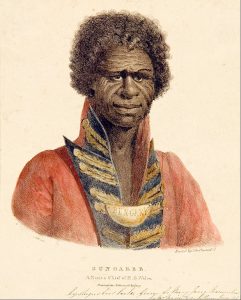Aborigines
 Originally, a mythical people of central Italy, connected in legendary history with Aeneas, Latinus and Evander. They were supposed to have descended from their mountain home near Reate (an ancient Sabine town) upon Latium, whence they expelled the Siceli and subsequently settled down as Latini under a King Latinus (Dion Halic. i. 9. 60). The most generally accepted etymology of the name (ab origine), according to which they were the original inhabitants ( = Gk. autochthones) of the country, is inconsistent with the fact that the oldest authorities (e.g. Cato in his Origines) regarded them as Hellenic immigrants, not as a native Italian people. Other explanations suggested are arborigines, “tree-born,” and aberrigines, “nomads.” Historical and ethnographical discussions have led to no result; the most that can be said is that, if not a general term, “aborigines” may be the name of an Italian stock, about whom the ancients knew no more than ourselves.
Originally, a mythical people of central Italy, connected in legendary history with Aeneas, Latinus and Evander. They were supposed to have descended from their mountain home near Reate (an ancient Sabine town) upon Latium, whence they expelled the Siceli and subsequently settled down as Latini under a King Latinus (Dion Halic. i. 9. 60). The most generally accepted etymology of the name (ab origine), according to which they were the original inhabitants ( = Gk. autochthones) of the country, is inconsistent with the fact that the oldest authorities (e.g. Cato in his Origines) regarded them as Hellenic immigrants, not as a native Italian people. Other explanations suggested are arborigines, “tree-born,” and aberrigines, “nomads.” Historical and ethnographical discussions have led to no result; the most that can be said is that, if not a general term, “aborigines” may be the name of an Italian stock, about whom the ancients knew no more than ourselves.
In modern times the term “Aborigines” has been extended in signification, and is used to indicate the inhabitants found in a country at its first discovery, in contradistinction to colonies or new races, the time of whose introduction into the country is known.